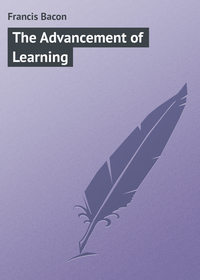Kitobni fayl sifatida yuklab bo'lmaydi, lekin bizning ilovamizda yoki veb-saytda onlayn o'qilishi mumkin.
«The Advancement of Learning» kitobidan iqtiboslar

“The TVVOO Bookes of Francis Bacon. Of the proficience and aduancement of Learning, divine and humane. To the King. At London. Printed for Henrie Tomes, and are to be sould at his shop at Graies Inne Gate in Holborne. 1605.” That was the original title-page of the book now in the reader’s hand — a living book that led the way to a new world of thought.

But further, it is an assured truth, and a conclusion of experience, that a little or superficial knowledge of philosophy may incline the mind of men to atheism, but a further proceeding therein doth bring the mind back again to religion. For in the entrance of philosophy, when the second causes, which are next unto the senses, do offer themselves to the mind of man, if it dwell and stay there it may induce some oblivion of the highest cause; but when a man passeth on further and seeth the dependence of causes and the works of Providence; then, according to the allegory of the poets, he will easily believe that the highest link of Nature’s chain must needs he tied to the foot of Jupiter’s chair.

... for as substance of matter is better than beauty of words, so contrariwise vain matter is worse than vain words: wherein it seemeth the reprehension of St. Paul was not only proper for those times, but prophetical for the times following; and not only respective to divinity, but extensive to all knowledge: Devita profanas vocum novitates, et oppositiones falsi nominis scientiae.

Here therefore the first distemper of learning, when men study words and not matter; whereof, though I have represented an example of late times, yet it hath been and will be secundum majus et minus in all time. And how is it possible but this should have an operation to discredit learning, even with vulgar capacities, when they see learned men's works like the first letter of a patent or limited book, which though it hath large flourishes, yet it is but a letter? It seems to me that Pygmalion's frenzy is a good emblem or portraiture of this vanity; for words are but the images of matter, and except they have life of reason and invention, to fall in love with them is all one as to fall in love with a picture.

And if any man be laborious in reading and study, and yet idle in business and action, it groweth from some weakness of body or softness of spirit, such as Seneca speaketh of: Quidam tam sunt umbratiles, utputent in turbido esse quicquid in luce est; and not of learning: well may it be that such a point of a man's nature may make him give himself to learning, but it is not learning that breedeth any such point in his nature.

For the third vice or disease of learning, which concerneth deceit or untruth, it is of all the rest the foulest; as that which doth destroy the essential form of knowledge, which is nothing but a representation of truth: for the truth of being and the truth of knowing are one, differing no more than the direct beam and the beam reflected. This vice therefore brancheth itself into two sorts; delight in deceiving and aptness to be deceived; imposture and credulity; which, although they appear to be of a diverse nature, the one seeming to proceed of cunning and the other of simplicity, yet certainly they do for the most part concur: for, as the verse noteth –
«Percontatorem fugito, nam garrulus idem est,»

This only I will add, that learned men forgotten in states and not living in the eyes of men, are like the images of Cassius and Brutus in the funeral of Junia, of which, not being represented as many others were, Tacitus saith, Eo ipso praefulgebant quod non visebantur.
